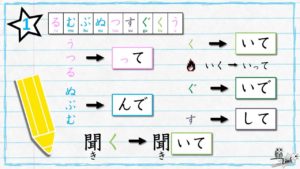The conjugation of Japanese verbs is one of the most difficult subjects for learners of Japanese. To begin with, conjugation refers to the change in verb form when a verb is followed by another word such as an auxiliary verb or particle. There are rules for verb conjugation, so let’s try to grasp these rules as clearly as possible. The first point to keep in mind about Japanese verb conjugation is to classify verbs into different types. Let’s divide verbs into three types based on their different conjugations.
If you have any questions, ask them for free! ➡ Japanese Question Form

Frequently Asked Questions

five-stage verb 五段動詞
Need to learn how to utilize Japanese verbs. They are very big in omitting the obvious,

Eto 干支 in Japanese culture
Eto Eto is a zodiac animal that forms a 12-year cycle. From November to December, next year’s animals will begin

Popular Side Jobs for Foreigners in Japan
More than 1.2 million people work in Japan on work visas. The maximum period of validity of a work visa

“Japanese Customs and Culture” that Surprises Foreigners
I have previously written an article titled “Japanese Customs and Culture that Foreigners Find Strange in Japan,” but there are






